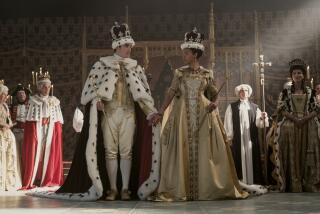Dutch Still Welcome Their Royal Inheritance
AMSTERDAM — It is still a crime to insult the royal family in the Netherlands, as a 24-year-old Dutchman recently learned when he was fined 500 guilders ($230) for displaying a poster depicting Queen Beatrix as a pig.
Most Dutch frown on insults to the House of Orange, the fate and fortunes of which have been entwined with the Low Countries for 400 years.
Periodic polls indicate that the public overwhelmingly favors retaining its constitutional monarchy.
“The Orange family belongs to the antique furniture that we’ve inherited, and it would be unwise to do away with it: They might be very valuable,” said historian Coenraad Tamse of Groningen University. “They offer a simple icon of the continuity of Dutch national identity.”
Since 1898, the Dutch have been led by three queens--the dour Wilhelmina, a symbol of hope during the five-year Nazi occupation; the motherly Juliana, and now the practical Beatrix, who has a strong sense of her role in Dutch life.
“Beatrix has a very strong notion of historic continuity, even though nothing could be further apart than the role of 16th-Century William and hers,” said royalty writer Fred Lammers, referring to Prince William of Orange, who led the Dutch fight for independence from Spain.
Although the 51-year-old Beatrix is far from a figurehead, her official statements are closely tailored to fit the policy of the elected government.
An attractive woman with the characteristic ruddy cheeks of her countrymen, Beatrix is unpretentious in public and dresses like a prosperous middle-class matron.
She and her husband, Claus, a former West German diplomat, mix easily with the public and eschew extravagance.
But Beatrix reportedly is concerned with maintaining respect for the monarchy and insists on being called “majesty,” rather than “ma’am,” which her mother Juliana preferred.
Over the centuries, the House of Orange has survived financial and romantic scandal, as well as occupation by Napoleon’s forces in 1795-1812 and by Hitler’s in 1940-45. Both times its members fled to England.
Its current hallowed image dates from Wilhelmina, Beatrix’s grandmother, who was “groomed to fit the mold formed by the supposed Dutch national traits: virtuousness, diligence, charity, religiosity, and aversion to violence,” historian Tamse said.
Wilhelmina’s bond with her people was irrevocably forged by her frequent morale-boosting radio speeches from London during World War II.
Periodic negatives have failed to tarnish the Orange image.
During the 1950s there was Queen Juliana’s reported dependence on a faith healer, which the media attributed to her depression over the near-blindness of her daughter, Princess Christina, born in 1947.
In 1964, daughter Princess Irene enraged hard-line Protestant factions by rejecting the royal family’s Dutch Reformed Protestant faith for Roman Catholicism to marry Prince Carlos Hugo de Bourbon-Parma, who now is King Juan Carlos of Spain.
Juliana’s husband, Prince Bernhard, was Dutch industry’s unofficial ambassador until his implication in the Lockheed bribery scandal in 1975.
He was stripped of his rank as inspector-general of the Dutch armed forces but is still highly popular and active in conservation issues.
Even the royal family’s wealth--reported to range from $80 million to $4.4 billion--has failed to incite popular resentment.
Beatrix and her family live in Huis ten Bosch (House in the Woods), an estate in The Hague visible from a public highway. Except for state occasions, Beatrix is driven around in a Ford.
Their three sons study in the state-run university system and room with friends.
The heaviest public insult to the monarchy came in 1980, when Juliana abdicated in favor of Beatrix. During the inauguration--Dutch monarchs are not crowned--stone-throwing squatters rioted outside.
“In hindsight, the inauguration riots had less to do with the monarchy than with anything else--the housing situation, unemployment and the like,” writer Lammers said. “But as national symbols, the royals bore the brunt of the unrest.”
Despite her circumscribed role, Beatrix’s interest in government is keen, according to sources close to the royal family.
She meets every Monday morning with Premier Ruud Lubbers and has at least one extensive policy discussion a week with other Cabinet ministers.
The royals draw a line at exploitation of their private life by the popular press.
Four years ago, Claus obtained a court-ordered retraction from a Dutch magazine for an unsubstantiated story alleging that their eldest son, Crown Prince Willem-Alexander, spent the night with a “mysterious blonde” in an Amsterdam hotel.
More to Read
Sign up for Essential California
The most important California stories and recommendations in your inbox every morning.
You may occasionally receive promotional content from the Los Angeles Times.










